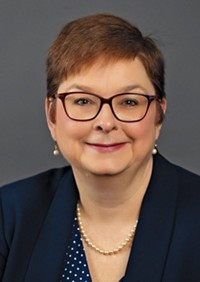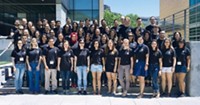Advertisement
Grab your lab coat. Let's get started
Welcome!
Welcome!
Create an account below to get 6 C&EN articles per month, receive newsletters and more - all free.
It seems this is your first time logging in online. Please enter the following information to continue.
As an ACS member you automatically get access to this site. All we need is few more details to create your reading experience.
Not you? Sign in with a different account.
Not you? Sign in with a different account.
ERROR 1
ERROR 1
ERROR 2
ERROR 2
ERROR 2
ERROR 2
ERROR 2
Password and Confirm password must match.
If you have an ACS member number, please enter it here so we can link this account to your membership. (optional)
ERROR 2
ACS values your privacy. By submitting your information, you are gaining access to C&EN and subscribing to our weekly newsletter. We use the information you provide to make your reading experience better, and we will never sell your data to third party members.
Environment
Green Chemistry Summer School Is International Draw
by MARY KIRCHHOFF
August 22, 2005
| A version of this story appeared in
Volume 83, Issue 34

The third annual summer school on Green Chemistry was held in Montreal on July 6-14. McGill University and Chao-jun Li, a chemistry professor there, hosted 57 graduate and postdoctoral students representing 17 countries for a week of lectures, discussions, poster sessions, and laboratory experiments. ExxonMobil Foundation was the primary sponsor of the program, with additional support from the American Chemical Society, the Chemical Institute of Canada, and McGill University. Two ACS units, the Green Chemistry Institute (GCI) and the Education Division, organized the summer school.
Following overview lectures on green chemistry by GCI Director Paul T. Anastas and on green engineering by Eric J. Beckman of the University of Pittsburgh and Joan F. Brennecke of the University of Notre Dame, students were introduced to a variety of specialized topics, including supercritical fluids, energy, and the sustainable design of chemical products.
John C. Warner of the University of Massachusetts, Lowell, discussed toxicology and his research on noncovalent derivatization. James E. Hutchison of the University of Oregon focused on green nanoscience and green chemistry education, as did Mary Kirchhoff of ACS's Education Division. Bacterial polyesters were described by Robert H. Marchessault of McGill University.
Berkeley W. (Buzz) Cue (retired from Pfizer) discussed the role of green chemistry in the pharmaceutical industry, including drug manufacture and fate of drugs in the environment. Applications of biocatalysis in green chemistry were emphasized by Carlos D. Gonzalez of the University of the Republic, Montevideo, Uruguay. Carnegie Mellon's Terrence J. Collins presented information on persistent, bioaccumulative, and toxic substances and highlighted the link between sustainability and ethics. Li provided examples of his research during a presentation on green chemistry in organic synthesis.
GCI's Kathryn Parent organized a series of laboratory experiments that gave students hands-on exposure to green chemistry techniques.
A proposal-writing workshop, led by Robert H. Rich of the ACS Petroleum Research Fund (PRF), introduced students to the skills needed to develop successful funding proposals and engaged student teams in drafting and critiquing proposal abstracts. A session on career management offered practical advice on job seeking, networking, and career options in chemistry. Two poster sessions provided a venue for students to discuss their research.
At the conclusion of the summer school, most students also participated in the "Chemistry in Context" workshop presented by textbook authors Catherine H. Middlecamp and Dwaine and Lucy P. Eubanks. This ACS text, designed for undergraduate students not majoring in science, introduces chemistry on a need-to-know basis in the context of environmental and health issues; it includes a significant green chemistry component. Workshop participants conducted inquiry-based experiments, considered assessment strategies, and explored the use of the Internet as a teaching tool.
The 2005 summer school was the third in a series that began with the Pan-American Advanced Studies Institute on Green Chemistry in Montevideo, Uruguay, in July 2003. This program, sponsored by the National Science Foundation and the U.S. Department of Energy, drew 55 students from five countries in the Americas. Carnegie Mellon was the site of the 2004 summer school, which was funded by PRF. Sixty-two students, representing 23 countries, participated in the weeklong program. Interest in the program has grown each year, with 105 students applying for the 60 available slots in 2005.
The student response to the program was very positive, with one student noting, "It has fundamentally changed the way I look at science." Another participant stressed the importance of applying what was learned during the program: "I teach a couple of labs that were modified into a greener perspective. Students loved it, so I wanted to find out more about green chemistry to transmit it to the next generation of scientists." Students also appreciated the organization of the summer school. "I was well taken care of. I will let my mom know," a student said.






Join the conversation
Contact the reporter
Submit a Letter to the Editor for publication
Engage with us on Twitter